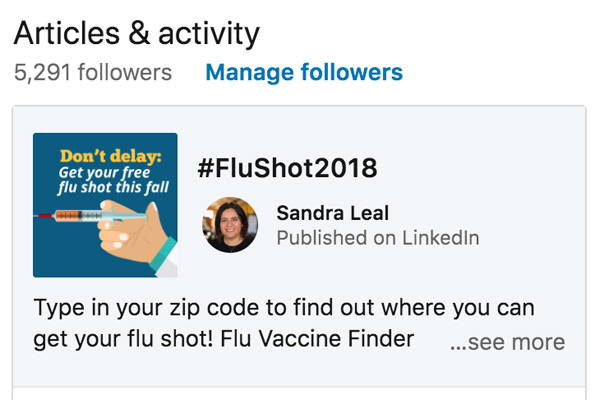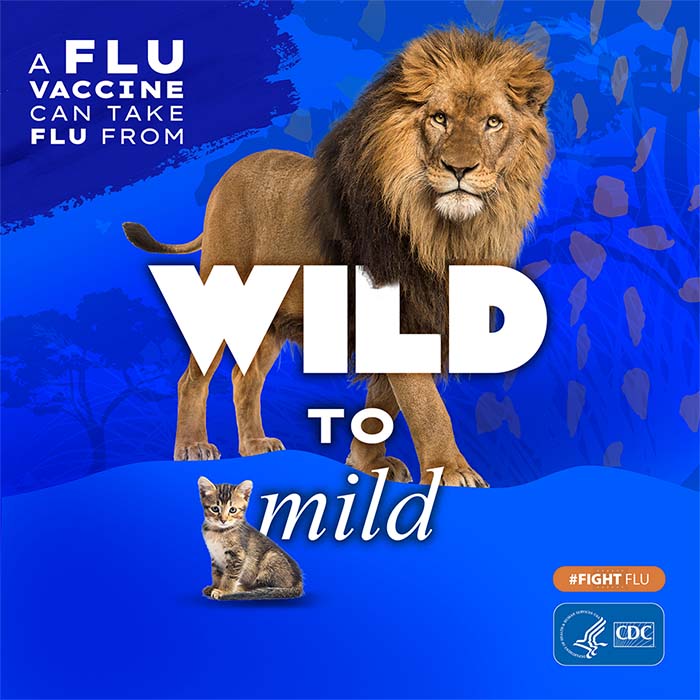Flu Fighter: Sandra Leal
Meet influenza (flu) fighter Dr. Sandra Leal. Dr. Leal is a pharmacist, Certified Diabetes Educator (CDE), and chief operating officer at SinfoníaRx, a national provider of Medication Therapy Management (MTM) services based in Tucson, Arizona. She also serves on the board of trustees for the American Pharmacists Association (APhA) and as board chair for the National Center for Farmworker Health. She has received many accolades for her work with medically underserved Hispanic and American Indian populations in her region. Dr. Leal is dedicated to improving patient safety and health outcomes for her patients. She works hard to increase access to preventative health services, including flu vaccines.
Name: Sandra Leal, PharmD, MPH, FAPhA, CDE
Title: Pharmacist, Certified Diabetes Educator (CDE), and chief operating officer at SinfoníaRx
Location: Tucson, AZ
- Can you share a few highlights of your experience in flu prevention? What is the most rewarding part of your work?
One of the areas that I work on consistently in flu prevention is in educating people about the importance of flu vaccination. I typically start my own personal vaccine campaign in social media in late August to early September to create reminders about the benefits of vaccination. I also start my conversations with a simple question to my patients, friends, and family to ask if they have already received their flu vaccine. My favorite social media picture of the year is one of my daughter getting her flu vaccine. Not only does that show my commitment to vaccinations, but I share that picture with patients who hesitate in receiving the vaccine if they have a concern. That always seems to be a winner in trying to convince them that if it is safe enough or good enough to protect her, then it must be good for them too. The most rewarding thing about providing a vaccination is knowing that no matter what else happens during the visit, they have received something that will last for the season. - In your role, how do you fight flu?
As a pharmacist, I fight flu by promoting increased access to vaccinations. Since the 1990s, state laws have been expanding pharmacists’ vaccination authority. These laws also have increased the number of vaccines pharmacists can administer to younger patients. I have been working directly with our state pharmacist association in Arizona and with the American Pharmacist Association to support legislation that increases access and public health for patients. The latest data on vaccinations shows that when pharmacists get involved, more vaccinations are given. - What is the most difficult part of flu prevention?
The most difficult part of flu prevention for me is when parents make the decision not to vaccinate their children because they are concerned about side effects or negative stories that they have read about related to vaccines. I am always concerned about the health of kids who do not get the protection they deserve. - How do you discuss flu vaccination with your patients?
The way I discuss flu vaccine with my patients is by simply asking the question, “Are you ready for your flu vaccine today?” If they have been seeing me for a while, they know how much I advocate for their health and well-being. If it is someone who has resisted receiving the vaccine before, or is a new patient, I consistently discuss the value [of flu vaccine] at every visit leading up to and during flu season. I also discuss my experience with this season’s vaccine so that they know that I already received mine. - What would you say to those who are hesitant about getting a flu vaccine?
If someone is hesitant about receiving their flu vaccine, I speak to them about how I line up first for the vaccine and then I take my daughter and mother to receive theirs. As I said earlier, I always take pictures of my daughter getting vaccinated so that they can see how important it is and they know that if I give it to her, then it is just as important for them. - What advice would you give to other health care professionals (HCPs) to improve their flu vaccination rates?
The advice I would give to other health care professionals to improve their flu vaccine rates is to always ask, keep asking, and work hard to avoid taking no for an answer. I always start my visit with the vaccine question first. That way I can get it right out of the way before they change their minds. If they don’t agree initially, I can spend the rest of the visit, discussing the importance of it, so that it gives me time to hopefully convince them before the visit is over.



